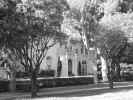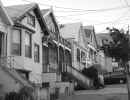District 7: Journey to the west
Thousands years ago, in the southwestern
reaches of the great beach that edges the San Francisco
Peninsula, a wall of sand dunes carved out a small lagoon.
As time went by, six feeder creeks turned the salt water to
fresh, and a small lake was formed. Laguna de Nuestra
Señora de la Merced, the Spanish called it. Lake of Our
Lady of Mercy.
Today Lake Merced occupies the
southwestern corner of the city. Long popular among boaters
and anglers, joggers and strollers, it can also be regarded
as a symbol of the political climate found in the
residential neighborhoods nearby. Both are in trouble.
The lake’s ills are easy to identify,
and have been presented to the public by numerous local
observers. Examiner outdoors writer Tom Stientstra says,
"San Francisco’s Lake Merced was once the nation's
best example of how to run a city program for fishing,
boating, and outdoor recreation. But now it resembles a
disaster area, and a restoration program under way by The
City is not addressing the sources of the grief."
Chronicle reporter Glenn Martin quotes a fisherman named
Steven Budovlya: "Look at that water — it's just
terrible, all green and cloudy. You can fish here all day
and not get a bite." "Lake Merced is basically
dying," says Dee Dee Workman, executive director of San
Francisco Beautiful. The water level has dropped from a
depth of more than 25 feet in the 1980s to about 19 today,
leading to lower water temperatures and decreased oxygen
content. Algae love the semi-tropical aquarium; trout hate
it, and it hates them.

In many circles, Lake Merced gets as much
lip service as Mom and apple pie. Everyone agrees it should
be fixed. But no one in a position to do anything about it,
does. "One of the major obstacles to getting the lake
restored," explains Workman, "is the fact that
there are a million different jurisdictions over the lake,
with very little communication between them." And until
recently, no one had enough political clout or determination
to form a bridge. Finally this summer, after six years of
labor by the Friends of Merced, a group of more than 35
public, environmental, and grass-roots organizations have
formed the Lake Merced Task Force. Do the Friends believe
salvation is at hand? Not if past experience is a valid
indicator: "We've put together a brief review of the
many promises made, and reached the conclusion that by and
large we all just wasted our time."
If District 7 ever gets around to
cross-stitching a sampler to hang on its figurative wall,
that statement will serve as its motto. Residents repeatedly
reveal their frustration at what they perceive as a lack of
attention from City Hall. When Leland Yee took his annual
budget show on the road last spring to palpate neighborhood
pulses, he heard the same refrain. City services don’t
extend to the parts of the city west of Twin Peaks. Yes,
there is little visible poverty on the streets out west, but
road surfaces there are pocked; public transit is
unreliable; parks are wastelands; the schools are a
disgrace. It’s a relatively wealthy area — the median
income of $48,582 is more than 15 percent higher than the
citywide equivalent. It’s a high property-tax area — 62
percent of the residents own their homes, compared to 35
percent citywide. Looking around their neighborhoods, they
wonder where the money went.

District 7 covers a vast area: David
Binder divides it into six neighborhoods that extend from
Judah to the southern city limit: West of Twin Peaks, West
Portal, Mt. Davidson, Sunnyside, St. Francis Wood/Lakeshore,
and Lake Merced/Stonestown. Despite progressive pockets in
Sunnyside and Lake Merced/Stonestown, voters tend to support
conservative candidates and propositions. Despite an Asian
population of about 26 percent, likely voters are
predominately white. Affluent, educated, and older,
residents seem unlikely to take to the streets brandishing
picket signs. And no one, to my knowledge, has begun to
campaign under the slogan, "No taxation without
representation." But they don’t like to be ignored.
District 7 is Mabel Teng’s turf.
Self-described as "the first non-incumbent Asian
Pacific American elected to the Board in a city-wide
election," she’s running on her record. But she’s
not overwhelmingly popular in her home district: in 1998,
she came in third, after Tom Ammiano and Gavin Newsom.
To be reelected, Teng will have to
overcome five challengers of varying talents and
temperaments. Harold Hoogasian, owner of Hoogasian Flowers,
is a member of the Republican Central Committee. Maryo
Mogannam, another retailer, takes the Gavin Newsom approach
to government: "Running a city can be like running a
small business." Elbert "Bud" Wilson
describes himself as a "neighborhood leader [who has
been] working for the neighborhoods since 1987."
Rennie O’Brien has posted signs all over
the district, in conjunction with his promise to knock on
the door of every voter. O’Brien started campaigning early
and hard, and much of San Francisco’s image of this race
comes from his letters to the Chronicle editor. A native of
District 7 and a product of city parochial schools, he works
as a chiropractor and divided his time between Hawaii and
the mainland for a number of years. His political stance is
Democratic in a frequently Republican area; much of his
political activism focuses on the environment or the
problems of low-income people.
And then there’s Tony Hall. Hall made
news late this summer when the Chronicle announced that he
had raised nearly as much money as Mabel Teng. The West of
Twin Peaks Observer describes him as a "bandleader and
court administrator" with, the Chronicle adds,
"strong ties to the city's old-line legal
establishment," presumably the source of much of his
campaign funding. (Hall himself augmented the happy gigolo
image by joking to the press, "A lot of judge’s wives
have given me money.")
But he’s also determined to win. Running
as a "pro-family, pro-property-owner independent,"
he has challenged Teng to stay under the $75,000 spending
cap, but he refuses to let noble spending principles deprive
him of victory. When asked about Ethics Commission reports
of expenditures in the thousands to political consultant
Terry Price, he notes that "Teng has all the money in
the world and can hire many consultants with expertise in
many areas."
A 25-year city executive, Hall
characterizes himself as the only challenger with actual
experience in San Francisco government. He characterizes
Teng as a "rubber stamp who has shown no leadership and
is the product of special interests" and adds that his
own appeal is to the "vested people" who have
lived in the district for many years. He speaks repeatedly
of tending to the issues that are important to the people in
his district.

At times the rhetoric that surrounds the
campaign in District 7 resembles a Hibernian argument at one
of Rennie O’Brien’s beloved rugby matches. But even the
name-calling rests on a very real anger — from all stripes
of the political spectrum — at years of neglect.